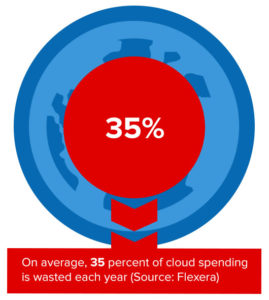
With most enterprises (84 percent, according to RightScale) now using a multi-cloud strategy, a new problem has become commonplace: managing cloud costs across various vendors and solutions. Half of enterprises spend more than $1.2 million each year on cloud solutions, and the no. 1 reported cloud priority for 2019 is cost optimization, the State of the Cloud report states.
Many have adopted cloud solutions partly for cost containment purposes, since they don’t require hardware like on-premise options. However, spending can easily climb as an organization adopts multiple clouds. A proactive and deliberate approach to cost management is crucial to optimize spending.
If you’re looking for ways to better manage your cloud expenditures, the following recommendations can help keep costs under control.
1. Monitor spending regularly. Make a habit of monitoring your daily cloud costs, according to the InformationWeek article “10 Tips for Managing Cloud Costs.” In larger companies, IT staff members typically spin up new instances all the time, so not paying attention to spending for weeks or even months will often leave you feeling caught off guard by spending levels.
2. Look into cloud cost management tools. Of course, you probably have enough to do without having to make the time to check on daily cloud costs. Luckily, you can streamline the process with monitoring tools. Many cloud vendors offer their own cost monitoring solutions. For example, Microsoft Azure recently announced the general availability of Azure Cost Management features for Azure Government and Pay-As-You-Go customers.
3. Identify areas of waste. On average, 35 percent of cloud spending is wasted each year, resulting in more than $10 billion down the drain in expenditures across Amazon Web Services (AWS), Azure and Google (the top public cloud vendors), according to the white paper “Essential Strategies for Managing Cloud Costs” from Flexera, the parent company of RightScale. Wasted spending usually results from the following four issues, according to the paper.
- Unautomated workloads. Automated tools are necessary to monitor cloud spending and identify and eliminate waste as it recurs over time.
- Choosing the wrong instance sizes. While migrating instances from on-premise infrastructure to the cloud, IT staff might mistakenly select a larger instance size than needed and often don’t reduce it later, leading to unnecessary spending.
- Confusing cloud pricing. With all the pricing options available to choose from, with thousands of different prices available for virtual machines alone from top public cloud providers, it’s easy to end up purchasing more storage than you need.
- Lack of visibility into resource costs. When provisioning takes place, resource owners might not have visibility into spending. The hourly rate might seem cheap, but it can add up considerably over the course of months or years.
4. Check for shadow IT. Shadow IT apps (those deployed without approval) can drive up cloud costs, according to the TechTarget SearchCloud Computing article “Cloud spending doesn’t need to be a guessing game.” If your cloud spending seems too high, make sure there aren’t apps running that your IT team isn’t aware of and didn’t agree to implement.
If you have any questions about cloud cost management or cloud solutions in general, our team of expert cloud consultants can assist you. We work with various offerings from a wide range of cloud vendors in our partner network, so we can offer insight into all kinds of solutions and assess whether they might benefit your business. Connect with us today by calling 877-599-3999 or emailing sales@stratospherenetworks.com.


